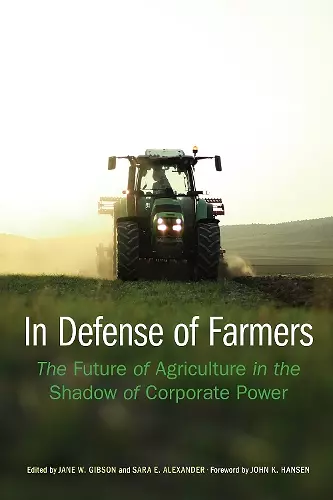In Defense of Farmers
The Future of Agriculture in the Shadow of Corporate Power
Sara Alexander editor Jane Gibson editor
Format:Hardback
Publisher:University of Nebraska Press
Published:1st Jul '19
Should be back in stock very soon

Industrial agriculture is generally characterized as either the salvation of a growing, hungry, global population or as socially and environmentally irresponsible. Despite elements of truth in this polarization, it fails to focus on the particular vulnerabilities and potentials of industrial agriculture. Both representations obscure individual farmers, their families, their communities, and the risks they face from unpredictable local, national, and global conditions: fluctuating and often volatile production costs and crop prices; extreme weather exacerbated by climate change; complicated and changing farm policies; new production technologies and practices; water availability; inflation and debt; and rural community decline. Yet the future of industrial agriculture depends fundamentally on farmers’ decisions.
In Defense of Farmers illuminates anew the critical role that farmers play in the future of agriculture and examines the social, economic, and environmental vulnerabilities of industrial agriculture, as well as its adaptations and evolution. Contextualizing the conversations about agriculture and rural societies within the disciplines of sociology, geography, economics, and anthropology, this volume addresses specific challenges farmers face in four countries: Bolivia, Brazil, Canada, and the United States.
By concentrating on countries with the most sophisticated production technologies capable of producing the largest quantities of grains, soybeans, and animal proteins in the world, this volume focuses attention on the farmers whose labors, decision-making, and risk-taking throw into relief the implications and limitations of our global industrial food system. The case studies here acknowledge the agency of farmers and offer ways forward in the direction of sustainable agriculture.
“Valuable for food system leaders and policy-makers and in graduate seminars. . . . [Analyses] highlight unsustainable methods and suggest improvements that could serve as a starting point for dialogues and decisions on changing the food system framework.”—Stacey F. Stearns, Journal of Agriculture, Food Systems, and Community Development
"In Defense of Farmers delivers a timely contribution to helping us better understand how we got to the corporate-hijacked food system we have today and how farm managers navigate this framework as they simultaneously promote and resist it. This edited volume is sharp in its critique while careful in its delivery, making it an important book for both scholars in the humanities and practitioners in the agricultural sciences. Through its successful disciplinary bridging, certainly contributing to its considerate tone, In Defense of Farmers will prove a useful foundation for practical conversations about the future of food production."—Nicole Welk-Joerger, H-Environment
"In Defense of Farmers provides a solid overview of the current moment in industrialized agriculture and its human costs."—Megan Birk, New Mexico Historical Review
“Feeding the world’s population in a sustainable manner is a topic of critical importance for all humankind. Those of us living in the developed world need to be cognizant of the perils of the industrialized model of agricultural production and the consequences of its adoption around the world. . . . Farmers’ voices are rarely heard, but this book now allows them to be heard with respect to the challenges of groundwater depletion, ‘big chicken,’ climate change, or the consequences of adopting new precision farming technologies.”—Michael J. Broadway, professor of geography at Northern Michigan University and coauthor of Slaughterhouse Blues: The Meat and Poultry Industry in North America
“In Defense of Farmers is critical from the empirical standpoint of those disturbing processes that have taken us to a standardized place where too few corporate actors make too many decisions about what we eat, where we eat it, and who reaps food production’s benefits while others bear the costs of compromising animal welfare, the environment, and the quality of food. Gibson and Alexander have assembled an impressive, interdisciplinary volume of authors who know their subjects so well that their disgust at capital concentration, environmental destruction, and routine violations of human and animal rights is palpable.”—David Griffith, professor of anthropology at East Carolina University and author of American Guestworkers: Jamaicans and Mexicans in the U.S. Labor Market
ISBN: 9781496206732
Dimensions: unknown
Weight: unknown
444 pages